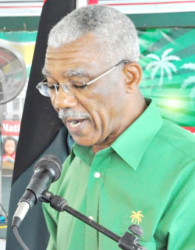President David Granger on Wednesday called on the Community of Latin American and Caribbean States (CELAC) to live up to its pledge to ensure the peaceful settlement of disputes as laid out in the December 2011 Caracas Declaration.
Speaking at the fourth summit of the group in Quito, Ecuador, Granger restated appeals he has made at previous conferences to help ensure the security of small states like Guyana.
While Granger made no reference to Venezuela, his appeal on the peaceful settlement of disputes will be seen as a thinly-veiled reference to the aggression launched by Caracas last year when it claimed large swathes of Guyana’s Atlantic waters.

This led to months of tension during which there were increased troop movements on the Venezuelan side and intrusion into Guyana’s waters among other acts which were deemed as provocative and threatening.
Noting that the Second Summit of CELAC held on 28 and 29 January 2014 in Cuba had issued the Special Declara-tion on Small-Island Developing States (SIDS) which recognized the particular vulnerabilities of the SIDS, Granger said that Guyana looked forward to the outcome of the Summit manifesting the spirit of that commitment with regard to the Community’s small states.
Adverting to their susceptibility to various threats and pointing out that they were now on alert for the Zika virus, Granger said “Exogenous shocks have resulted in economic distress. Small states have only limited capacity to independently, individually and decisively respond to these shocks and threats.”
He said that the European Union had also unjustly blacklisted certain small Caribbean states on account of their international financial transactions.
“The solutions to the challenges facing us are beyond the individual capabilities even of the strongest states amongst us. Common problems demand a common approach. Present-day transnational challenges demand coordinated multi-national action. It is only through collective action that we can uphold the principles embraced in our founding charter”, Granger said.
He then adverted to The Caracas Declaration of 3rd December, 2011 which he said obliges CELAC to take account of “respect for International Law, the peaceful settlement of disputes and the prohibition of the use of and threat of use of force, the respect for self- determination, respect for sovereignty and territorial integrity…”
CELAC, he noted also pledged to “promote the development of instruments to ensure compliance with those values and principles.”
Granger said that that commitment envisages an end to provocations and use of force. “It precludes gunboat diplomacy. Any violation of this commitment by members of CELAC to resolve territorial conflicts in a peaceful manner can throw our hemispheric solidarity into jeopardy. The 21st century must be a century of peace for the Community of Latin American and Caribbean States”, he said.
Granger proposed that CELAC establish a permanent mechanism to transform those intentions into implementation and action.
He said that CELAC can play a role in promoting reconciliation and preserving this hemisphere as a ‘zone of peace’ and had demonstrated its continental peace-making capability in the Colombian conflict. CELAC must be commended on this achievement, he said.
Granger urged that CELAC remain engaged in promoting the pursuit of peaceful settlements of international controversies and to discourage the use or threat of force everywhere in the hemisphere.




